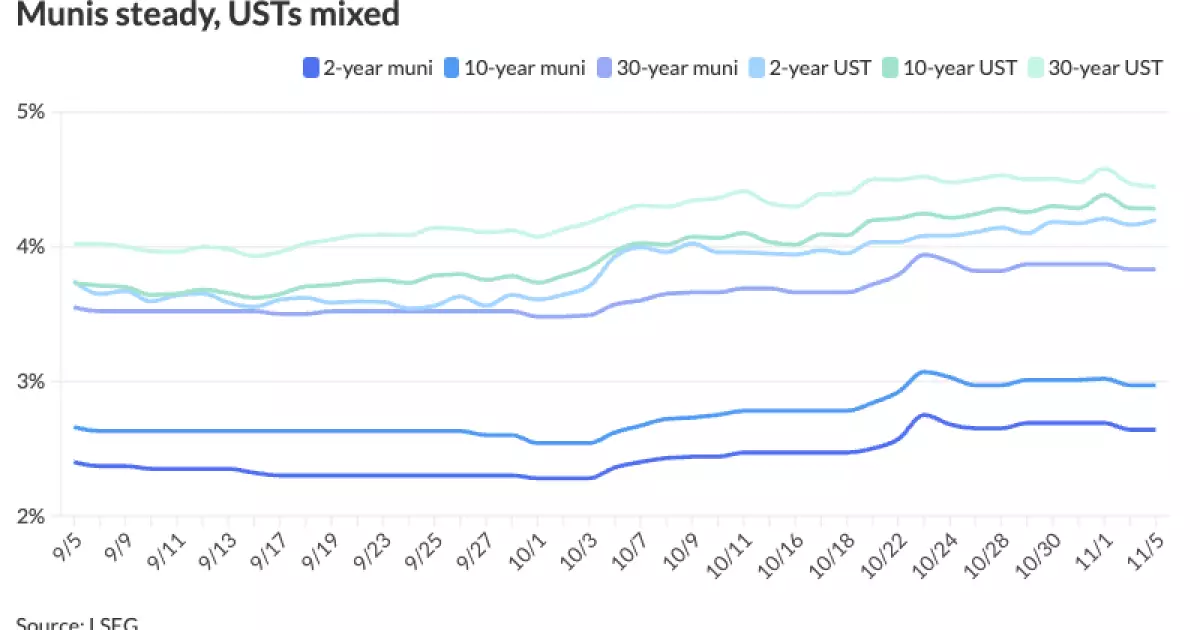Political events can significantly influence financial markets, and the upcoming election alongside the decisions from the Federal Open Market Committee (FOMC) have put municipal bond market participants on high alert. As monetary policy decisions loom, the interplay between upcoming political outcomes and market expectations underscores the heightened volatility that could ensue. Investors are carefully tracking news that could impact interest rates and economic stability, particularly as it pertains to the movements of municipal bonds.
Market participants are currently awaiting the FOMC’s decision on interest rates, anticipating possible cuts that could create ripples throughout the economy. U.S. Treasuries displayed mixed performance recently, with some investors choosing to remain on the sidelines until clearer signals emerge from the election results and Federal Reserve announcements. Analysts hint that a potential rate cut, while widely expected, may hold varying implications depending on the election outcomes. Specifically, experts note how different political victories can engender vastly different economic climates—ranging from inflationary pressures to a maintenance of the current fiscal status quo.
As the political landscape shifts, so do corresponding market sentiments. The implications of a Trump victory could lead to expectations of a more inflationary environment primarily due to proposed changes in trade policies that may increase tariffs on various goods. Conversely, a Harris win may signal stability and continuity in policies that could dampen inflation concerns. This divergence in expected policy outcomes emphasizes the correlation between political results and market valuations of municipal bonds, especially as they relate to fiscal expenditures and tax regulations.
For investors, these anticipatory sentiments translate into strategic positioning. J.P. Morgan strategists have outlined various scenarios, with a division of Congress making it more complicated to pass transformative legislation, which would impact tax-exempt municipals. A Republican-controlled Congress could stall efforts to lower corporate taxes, directly influencing investor attitudes towards bonds issued by municipalities.
RBC Global Asset Management’s insights suggest that despite current unease, recent years have witnessed a fixed-income market heavily influenced by Federal Reserve policy decisions rather than political administrations. However, the potential return of policies reminiscent of Trump’s presidency beckons a reevaluation. Any resurgence of tariffs could spark a complex chain reaction negatively impacting the bond market, complicating the Fed’s ability to maneuver monetary policy effectively.
Bryce Doty of Sit Investment Associates reinforces this assertion by arguing that market behavior currently seems to reflect an assumption that a Trump victory would hinder further Fed rate cuts. Such convergence of opinion among varying market analysts signals an emerging consensus—but also highlights a level of uncertainty that investors must navigate.
One of the crux issues at play is the burgeoning national debt—a concern that is unlikely to dissipate regardless of the election results. Rising deficits present a dual challenge for the Federal Reserve, which must choose between accommodating growth through lower interest rates or maintaining higher rates in response to increasing inflation. Such complexities signal the Fed’s efforts to carve out a balanced approach amid volatile economic conditions.
Further complicating matters, investment strategies in the municipal sector may find opportunity in the elevated inflationary landscape, prompting discussion around the long-term utility of municipal bonds as a hedge against national fiscal policy changes.
The upcoming election and the concurrent FOMC decision will undoubtedly be key determinants in shaping market dynamics. Experts predict that if the Fed chooses to only minimally lower rates, it could bring some stability to the equity and fixed-income sectors. Investors are leveraging tactics to prepare for a variety of political scenarios that could alter the landscape of municipal bonds.
As the market braces itself for potential shifts arising from political events, the complexities of monetary policy and economic health remain paramount. The intersection of political outcomes and financial strategy showcases not simply the volatility inherent to bond markets but the necessity of proactive adaptability in navigating uncertain futures. This is a moment for caution, as well as strategic readiness to adjust to whatever economic scenarios unfold.

